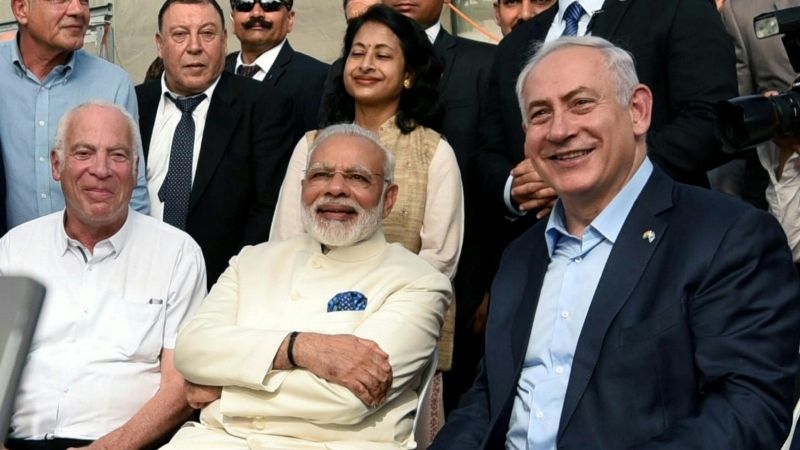Game, set, peace: India & Israel rally on
Editor’s note: Back in 1987, a scheduled tennis match kicked off a series of events that pretty much transformed India’s policy toward Israel overnight. Today, the two countries may be close, but it wasn’t always so.
Journalist Azad Essa, in his fascinating new book, Hostile Homelands, documents the evolving friendship between India and Israel, detailing the historical roots of Zionism and Hindutva. Here, he writes of a scathing report by the US-based Anti Defamation League, an organisation founded to oppose antisemitism, which led to a rejigging of relations between the two countries. Hostile Homelands by Azad Essa has been excerpted with permission from Westland Publications.
The Israeli lobby’s ability to exercise influence over US foreign policy has always been proportional to the interests of the US, but its ability to turn criticism of Israel into existential crises for Jews and to spin American backing of Israel as a moral and just undertaking, paramount to Israel’s existence, has added to the mythology surrounding its scale of influence.
Not only did these organisations appear to possess the power to influence legislation on behalf of Israel, but they also seemed to have the ability to influence American policy towards other countries on account of those countries’ ties with Israel. That these organisations were not always able to exercise power over the US government was of little importance; the perception of influence was the point.
In 1987, India came face to face with the ADL over a tennis match. Indian authorities had refused to grant visas to the Israeli tennis team ahead of a Davis Cup tie in New Delhi in July. Two months ahead of the tie, the ADL released a scathing report titled ‘India’s campaign against Israel’, accusing India of being among the ‘few countries outside the Arab world [to] have been so unrelentingly hostile to Israel’. It cited seventeen cases of India refusing visas to Israelis since 1980, condemned its vehemently public pro-Palestinian stance and recommended US sanctions. The contents of the report shocked Delhi. Already reeling from a reduction of aid from the US Congress, Rajiv Gandhi’s government responded by issuing visas.
The ADL report effectively changed Indian policy overnight. In June 1988, PM Rajiv Gandhi travelled to New York City, where he met with the leadership of the ADL and the AJC. The meeting had been arranged at the behest of Stephen Solarz, an American lawmaker from Brooklyn, home to sizeable Jewish and Indian American communities. PM Rajiv Gandhi reportedly told the leaders of these two Zionist lobby groups that he wanted to secure closer ties with the US. Academic Nicolas Blarel writes that ‘in response, the Jewish organisations criticised India’s prejudiced conduct toward Israel ... they also asked India to pressure the Palestinians to renounce their call for the destruction of Israel and to follow the Egyptian example [Egypt signed a peace accord with Israel in 1979]’.
Though it’s unclear what the Indian PM promised during the meeting, within hours, news of the interaction had already made its way to Shimon Peres (the Israeli foreign minister), who told the Israeli media that an upgrade of relations was imminent. A bewildered Indian government in New Delhi was forced to issue a clarification. Responding to a question in Parliament, K.K. Tewari, the minister of state in the Ministry of External Affairs, described Peres’s invocation as ‘totally unrelated to the facts’. Within weeks however, India reinstated Israel’s consul general in Bombay. The Israelis had been without a senior diplomat in India for six years. Again, the Indian government denied that this had come about following the PM’s meetings with the ADL. Six months after the Israeli lobby asked Delhi to pressure the Palestinians to recognise the state of Israel, the PLO announced its acceptance of a two-state solution and, in effect, recognised the state of Israel.
A year later, in 1989, leading members of the ADL, as well as Congressman Solarz, travelled to New Delhi, where they met P.V. Narasimha Rao, the external affairs minister, and P.K. Singh, the joint secretary in the Ministry of External Affairs, to talk about the ‘normalisation’ of ties. On their return to the US, Jesse N. Hordes, a member of the delegation, said that ‘the basic decision to change direction had already been made’. And it showed. It wasn’t long before Delhi instructed the Maharashtra government to include the Israeli consul general in all official events.
As a part of its complaint in 1987 about the Indian government’s treatment of Israel, the ADL was particularly incensed by the restrictions placed on the Israeli consulate in Bombay, going so far as to accuse New Delhi of treating its diplomatic mission with even more hostility than it did Pakistan’s. The subsequent relaxing of travel restrictions for Israelis wanting to visit India was the first step in forever altering Israel’s place in India’s imagination. While there was still no Indian embassy in Israel itself, Indian embassies in London and the US functioned as intermediaries for Israeli business and tour groups seeking to visit India.The Israeli lobby’s impact on the Indian government had another consequence. It introduced the Indian community in the US to the power of diaspora politics.


 souk picks
souk picks